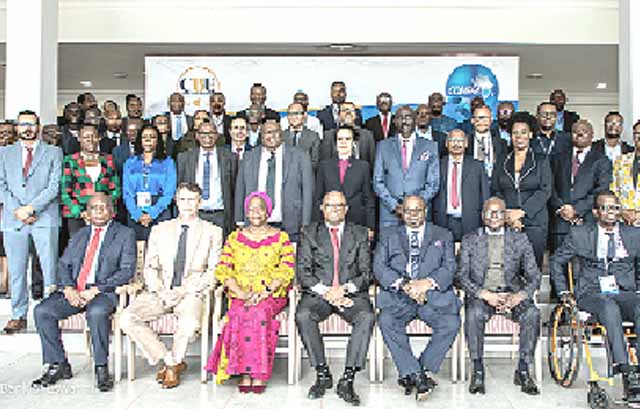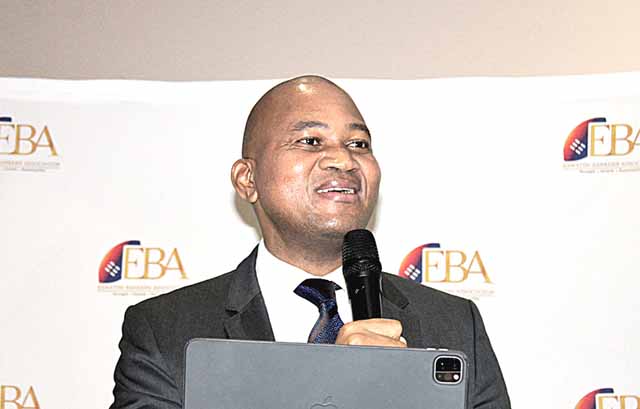By CENTRAL BANK REPORTER | 2024-11-15

The Common Market for Eastern and Southern Africa (COMESA), working with all their member States, looks poised towards creating a secure and efficient financial environment that supports its regional integration goals.
In the past week, the Committee of Governors of Central Banks, under COMESA engaged in a five-day meeting, which encompassed an array of discussions that were of interest to the regional body.
The meeting was hosted by the Central Bank of Eswatini (CBE) by virtue of being Chairperson of the Committee of Governors.
Dr Phil Mnisi, the CBE Governor, welcomed the about 60 delegates to Eswatini and challenged them to engage in discussions that will improve the overall agenda and goals of COMESA.
When officially opening the Meeting of the Experts of the Bureau of the COMESA Committee of Governors of Central Banks last Monday, Dr. Mnisi said the gathering was to reaffirm their commitment to the COMESA regional integration agenda, which is crucial in fostering economic growth and stability across COMESA member States, and one of the key pillars in achieving this is through financial and monetary cooperation.
He noted that Central banks played a crucial role in this integration process. “Economic convergence, policy coordination, and central bank independence are topical issues that are already receiving our attention in our various countries as part of the goals towards a Monetary Union.
As Central Banks, we have our work cutting across inflation control, fiscal discipline and debt management among others, in ensuring that we have sound monetary and fiscal policies,” the Governor said.
He added, “We have our institution, the COMESA Monetary Institute, whose overall objective is to undertake all the technical, policy, statistical, institutional and legal preparatory work.
The ultimate goal is that this work culminates in the COMESA Monetary Union.
The institution has been carrying demand-driven capacity building for Central Banks, research activities, and workshops for the improvement of macroeconomic management and financial system stability.”
. . . COMESA Central Banks challenged to mitigate cybersecurity risks
Central Banks within the Common Market for Eastern and Southern Africa (COMESA) have been challenged to employ strategic responses to cybersecurity threats.
Chief Information Security and Risk Officer of the Ghana Association of Bankers Audrey Mnisi spelled out the need to enhance cybersecurity frameworks by developing regional cybersecurity standards, establishing information sharing mechanisms, build cyber resilience through continuous monitoring and testing, for instance, establishing a COMESA Cyber Threat Intelligence Center, and a harmonised regulatory framework for fintech and digital banking.
“Another intervention would be to strengthen digital capabilities by upskilling central bank staff, investing in advanced data analytics, and modernising IT infrastructure.
The COMESA Central Banks could also look into collaborative approaches which may include regional coordination on digital banking policies as well as public-private partnerships for cybersecurity,” she said.
Mnisi then unpacked the notable cyberattacks on Central Banks, including the Central Bank of Gambia, which suffered a significant data breach in 2022, with two terabytes of data stolen.
She also reported that the Bank of Zambia experienced a hit in 2022, disrupting its Bureau de Change Monitoring System and website, urging stakeholders in the financial sector to be extra vigilant as these incidents may not have been in isolation.
Despite these attacks, Mnisi noted that there were lessons to be learned. “Some attacks have shown evidence of international cybercriminal networks targeting African banks. Also, many experts believe that cyber-attacks are significantly underreported due to reputational concerns and less stringent disclosure requirements.
“This means there is an urgent need for cybersecurity skill development in the African banking sector,” she said.
With the advent of financial inclusion in the face of security risks, Mnisi asserted that banks faced the challenge of rapidly expanding digital services for financial inclusion while ensuring robust security, adding that often times banks found themselves sacrificing security in their efforts to expand services.
. . . COMESA continues to support negotiations in key service sectors
As part of COMESA’s broader strategy to enhance economic integration and inclusivity in the region, the regional body has been working on trade facilitation instruments to overcome barriers and accelerate intra-regional trade and investments.
COMESA Secretary General Chileshe Mpundu Kapwepwe said this groundwork has perched COMESA’s continuous efforts to support negotiations in key service sectors, including business, financial, transport, communications, tourism, construction and energy services, among others.
“As a result, I am delighted to note that COMESA has made significant strides in regional integration and trade facilitation. Intra-COMESA trade has grown tremendously from just US$1.5 billion in 2000 to US$14 billion in 2023.
Despite these gains, intra-COMESA trade remains a relatively modest 7 per cent of the region’s total trade and a much smaller portion relative to what the regions trades with the outside world,” she said. She informed the delegates that as they celebrated achievements, they must also acknowledge the challenges.
“The geopolitical tensions that have emerged in various parts of the world, adverse climate events, and a cost-of-living crisis among others, pose significant risks to our economies and our integration efforts.
“These shocks are putting considerable strain on the regional economies and the world alike in the form of persistent disruption in global supply chains and increased inflation, increased volatility in global financial markets, and tightening global financing conditions.
“This has put considerable pressure on exchange rates in developing countries, which in turn has heightened debt vulnerability and increased domestic inflation. We must remain vigilant and proactive in addressing these challenges, bolster our togetherness as a region, and find solutions that work for us,” she said.
share story
Post Your Comments Below

Reported bank-related fraud cases have surged by 53.3 per cent compared to the previous year.
So, by this time last year, excitement filled the air and with so much optimism for what lied ahe...

SOCCER - IT'S all set for today's game, with Sihlangu Semnikati captain Sifiso ‘Ayoba&rsquo...

The Common Market for Eastern and Southern Africa (COMESA), working with all their member States,...
All material © Swazi Observer. Material may not be published or reproduced in any form without prior written permission.
Design by Real Image Internet